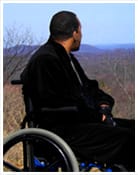Special Considerations In Proving Damages In Nursing Home Abuse
If a resident has been injured in the care of a nursing home facility or at the hands of a nursing home employee, action must be taken. There are special legal considerations involved when proving nursing home injuries. Mental suffering, disfigurement, loss of enjoyment in life, shortened life expectancy and malicious and reckless conduct by the nursing home staff are just some of the injuries for which damages may need to be proved in cases involving nursing home abuse. If you are a nursing home resident who has been harmed in the nursing home setting, or if you care about such an individual, you are invited to contact an experienced elder law attorney at Ellis Law, P.C. in Poughkeepsie, NY about the legal rights of nursing home patients.
Emotional And Physical Pain
Mental or physical suffering are common forms of nursing home abuse. Emotional abuse often shows itself in the form of fear. A patient is suffering emotional abuse if they are afraid of the consequences while waiting for help. They may be afraid that their injury will worsen as they wait for someone to assist them or afraid that by the time someone comes to their aid the injury will have worsened. A patient may also have had fear at the time the injury occurred and experienced anxiety for his or her own well-being. After an injury occurs, an individual may also fear the physical consequences of that injury such as surgery and further injuries or future injuries at the hands of the person or persons who caused the injury in the first place. Emotional suffering may also lead to loss of enjoyment of life. The physical results of an injury may have caused disfigurement or a shortened life expectancy.
Punitive Damages
Many injured nursing home residents are elderly, have health issues and have shorter life expectancies. Punitive damages may be more common in a nursing home injury case then in other types of personal injury cases. Awards against nursing homes that are punitive damages are usually for mental anguish, pain and suffering experienced by the injured person, medical expenses and the loss of affection and companionship by the surviving spouse or children.
To be awarded punitive damages, malicious or reckless conduct by the nursing home facility or staff must be proven. This conduct may be demonstrated by showing that the nursing home knew of the problems in the facility and did nothing to correct them. Some examples of this wanton conduct include understaffing, inadequate employee criminal background checks and employees not caring for known patient health issues properly. When staff members do not care for patients properly, injuries occur that may be shown to prove punitive damages. Injuries caused by negligent or intentional omissions of care generally fall into six categories: restraint injuries, decubitus ulcers (bedsores), severe dehydration/malnutrition, exposure to the elements (wandering around the facility, elopement/leaving the grounds) and physical abuse or assault (hitting, pushing, force-feeding, unsanitary environment, using unnecessary physical restraints).
Damages Recoverable By Survivors, Heirs Or Dependents
Due to the growing number of elderly persons in the United States, there has been an increase in lawsuits and damages against nursing homes by loved ones or survivors of injured residents. In an action against a nursing home where the resident has died, the resident’s survivor(s) may be able to bring an action and recover damages. Some damages may be based on loss of consortium or affection, loss of parental advice and guidance, mental anguish of the survivor and funeral expenses.
Speak To A Personal Injury Lawyer
If you or a loved one has been injured due to the fault of a nursing home or its employees, contact an attorney at Ellis Law, P.C. in Poughkeepsie, NY, experienced in pursuing legal compensation in these cases.

